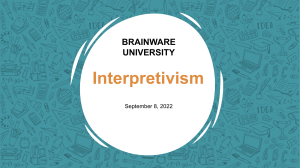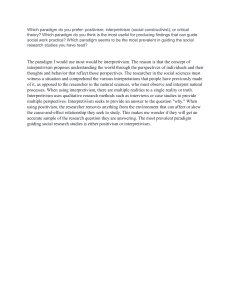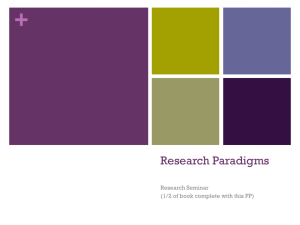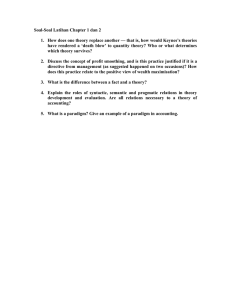Interpretivism: A Presentation on Social Science Philosophy
advertisement
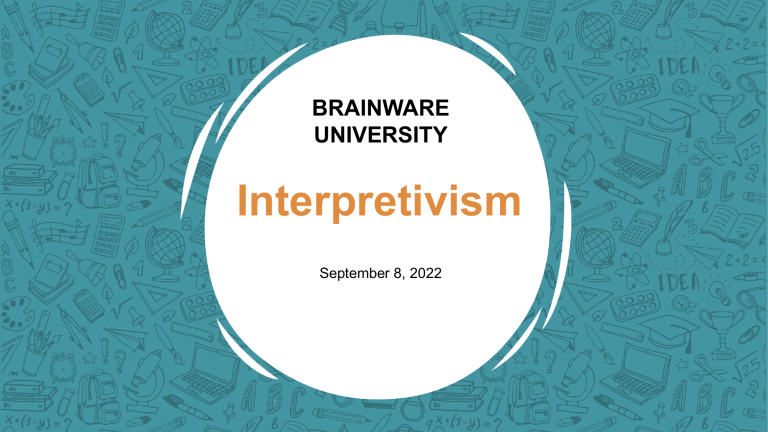
BRAINWARE UNIVERSITY Interpretivism September 8, 2022 Contents 1. What is paradigm? 2. What is paradigm shift? 3. Introduction 4. Origin 5. Concept 6. Advantages 7. Disadvantages 8. Conclusion 9. Bibliography What is paradigm? • A paradigm is a set of ideas and beliefs which provide a framework or model which research can follow. A paradigm defines existing knowledge, the nature of the problem(s) to be investigated, appropriate methods of investigation, and the way data should be analyzed and interpreted. The interpretivist paradigm developed as a critique of positivism in the social sciences What is paradigm shift? • A paradigm shift is defined as "an important change that happens when the usual way of thinking about or doing something is replaced by a new and different way." INTRODUCTION • Interpretivism is an approach to social science that asserts that understanding the beliefs, motivations, and reasoning of individuals in a social situation is essential to decoding the meaning of the data that can be collected around a phenomenon. • Interpretivist approaches to research differ from positivist ones in their emphasis on qualitative data and focus on context ORIGIN • Welcome parents to your classroom. • List the goals for the open house: o To help parents understand the work students will be doing throughout the school year. o To explain your expectations for all students. o To share information about how parents can support student learning. CONCEPT • Works in contrast to positivism: o Unlike positivism it takes in account the how the organism react to a certain stimuli and then try to evaluate the context. • Believes that reality is subjective • Considers the organism’s response to the stimuli while calculating the outcome • Works on S-O-R model S-O-R Model The SOR model in psychology suggests that the ‘O’ or the organism has an active and mediating function unlike the S-R Model. Advantages 1. It understands the uniqueness of humans and human behavior despite social structures. 2. It sees humans as active rather than passive. 3. It considers social context and cross – cultural dynamics. 4. It Disadvantages 1. It is argued to underestimate the impact of nurture on the response of the organism. 2. It can only be done with small samples because findings on ;arge samples cannot be generalized to the wider population. 3. It is low in reliability, as the research cannot be replicated by other researchers. This is due to unique situation of each type of research. 4. It may cause ethical dilemmas with certain research methods, such as covert observations. 5. It can be time consuming and inefficient (for example, every interview has to be transcribed and codified.) Conclusion It has been great pleasure for us to work on this project. It was very insightful as it provided us with practical knowledge regarding interpretivism. Also not only we gained experience on how to develop and prepare a presentation but also how to work together effectively and use the resources properly. This will take us one step forward to future possibilities. Bibliography 1. BOOKs o Introduction to Psychology by Morgan and King o B. K. Mishra 2. Websites o https://research-methodology.net/researchphilosophy/interpretivism/ THANK YOU Suraj Kumar Midya – BWU/BPY/22/022 Arunima Patra – BWU/BPY/22/001 Pritam Santra – BWU/BPY/22/005
